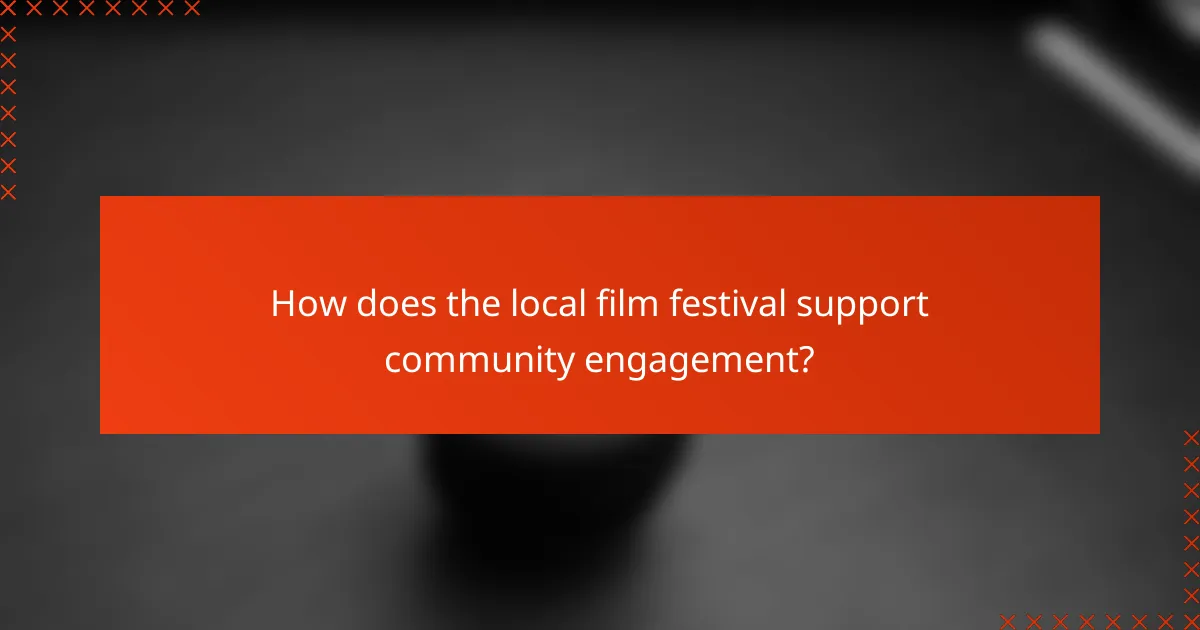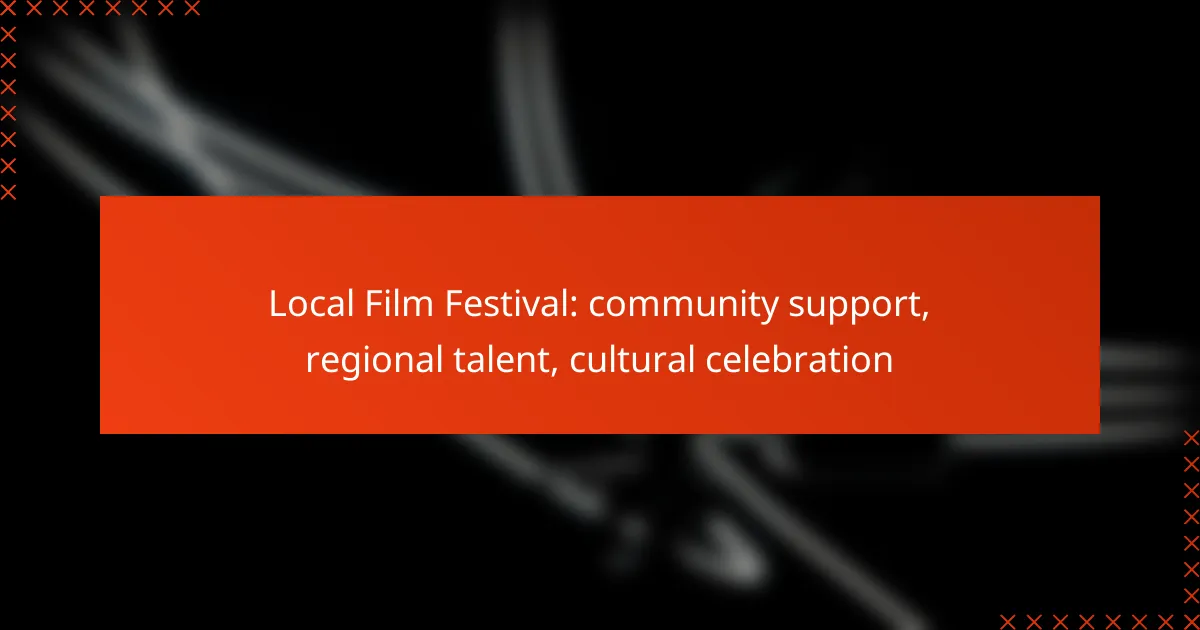The local film festival serves as a vibrant celebration of community and culture, bringing together filmmakers and audiences to showcase regional talent. By highlighting diverse stories and perspectives, the festival fosters collaboration and engagement, creating an inclusive environment that enriches the cultural fabric of the area.

How does the local film festival support community engagement?
The local film festival fosters community engagement by providing a platform for regional talent, encouraging collaboration, and celebrating local culture. It brings together filmmakers, artists, and audiences, creating an inclusive environment that promotes creativity and connection.
Workshops and panels for local filmmakers
The festival hosts workshops and panels designed specifically for local filmmakers to enhance their skills and knowledge. These sessions cover various topics, including scriptwriting, cinematography, and editing techniques, often led by industry professionals.
Participants can expect to engage in hands-on activities and discussions that provide practical insights. Many workshops are tailored to different experience levels, ensuring that both beginners and seasoned filmmakers can benefit.
Networking opportunities for artists and audiences
Networking events are a key feature of the festival, allowing artists to connect with each other and with audiences. These gatherings often include informal meet-and-greets, panel discussions, and Q&A sessions, fostering relationships that can lead to future collaborations.
Attendees can share their work, exchange ideas, and gain valuable feedback. This interaction not only builds community but also enhances the visibility of local talent within the broader film industry.
Collaborative projects with local schools
The festival actively collaborates with local schools to engage students in the filmmaking process. These projects often involve students in creating short films or documentaries, providing them with hands-on experience and exposure to the film industry.
By partnering with educational institutions, the festival helps cultivate a new generation of filmmakers and fosters a love for storytelling. This initiative not only enriches students’ learning experiences but also strengthens community ties through shared creative endeavors.

What regional talent is showcased at local film festivals?
Local film festivals prominently feature a diverse array of regional talent, including emerging filmmakers, university students, and documentary creators. These festivals serve as platforms for showcasing unique stories and perspectives that reflect the community’s culture and creativity.
Emerging filmmakers from Sydney
Sydney’s vibrant film scene is home to numerous emerging filmmakers who bring fresh ideas and innovative storytelling techniques to local festivals. These filmmakers often explore themes relevant to their communities, using their work to address social issues, cultural identity, and personal narratives.
Many of these talents have access to resources such as film schools and workshops, which help them refine their skills. Festivals provide them with essential exposure, allowing them to connect with industry professionals and gain valuable feedback on their projects.
Short films from Australian universities
Australian universities are a breeding ground for creative talent, producing a wealth of short films that are often featured at local festivals. These films typically showcase the unique perspectives of student filmmakers, who experiment with different genres and styles.
University film programs often encourage collaboration, resulting in projects that highlight teamwork and diverse viewpoints. Festivals provide a critical platform for these students to present their work, fostering connections with peers and industry leaders.
Documentaries highlighting local stories
Documentaries at local film festivals frequently focus on stories that resonate with the community, shedding light on regional history, culture, and social issues. These films often feature interviews with local residents, archival footage, and immersive storytelling techniques that engage audiences.
By showcasing local stories, these documentaries not only entertain but also educate viewers about their community’s heritage and challenges. Festivals play a crucial role in promoting these films, ensuring that important narratives are shared and preserved for future generations.

How do local film festivals celebrate cultural diversity?
Local film festivals celebrate cultural diversity by showcasing a variety of films that reflect different backgrounds, traditions, and perspectives. These events create a platform for underrepresented voices and foster community engagement through shared cultural experiences.
Screenings of multicultural films
Screenings of multicultural films are a cornerstone of local film festivals, offering audiences a chance to experience stories from various cultures. These films often highlight unique narratives that may not be widely available in mainstream cinema, providing insight into different lifestyles and values.
Festivals typically curate a selection of films from diverse regions, including independent productions and international features. This not only broadens viewers’ horizons but also encourages dialogue about cultural differences and similarities.
Inclusion of Indigenous storytelling
Inclusion of Indigenous storytelling is vital in celebrating cultural diversity at local film festivals. These stories often convey deep-rooted traditions, histories, and contemporary issues faced by Indigenous communities. By featuring Indigenous filmmakers and narratives, festivals promote awareness and understanding of these cultures.
Events may include panel discussions or Q&A sessions with Indigenous creators, allowing audiences to engage directly with the storytellers. This interaction enhances appreciation for Indigenous perspectives and fosters a sense of community among attendees.
Workshops on cultural representation in film
Workshops on cultural representation in film are essential for educating filmmakers and audiences about the importance of authentic storytelling. These sessions often cover topics such as cultural sensitivity, the impact of representation, and techniques for accurately portraying diverse characters and narratives.
Participants can learn from industry professionals and gain practical skills to enhance their own projects. By fostering a deeper understanding of cultural representation, these workshops contribute to the creation of more inclusive and respectful films in the future.

What are the economic benefits of local film festivals?
Local film festivals provide significant economic benefits by attracting visitors, creating jobs, and fostering partnerships with local businesses. These events stimulate the economy by increasing tourism and supporting regional talent, which contributes to a vibrant cultural scene.
Boosting local tourism in Melbourne
Local film festivals in Melbourne attract tourists from nearby regions and beyond, significantly boosting the hospitality and service sectors. Visitors often spend on accommodations, dining, and entertainment, leading to increased revenue for local businesses.
For example, a well-promoted festival can draw thousands of attendees, resulting in a noticeable uptick in hotel bookings and restaurant reservations during the event. This influx can benefit the local economy well beyond the festival dates.
Creating job opportunities in the film industry
Film festivals create various job opportunities, from production roles to event management positions. These jobs often include temporary roles that can lead to more permanent positions within the local film industry.
Additionally, festivals can stimulate interest in film-related careers among local youth, encouraging them to pursue education and training in the arts. This can lead to a more skilled workforce in the creative sector over time.
Supporting local businesses through partnerships
Local film festivals often collaborate with businesses for sponsorships, promotions, and services, creating mutually beneficial partnerships. These collaborations can enhance the festival experience while providing businesses with marketing opportunities.
For instance, local cafes and shops might offer discounts to festival-goers, increasing foot traffic and sales. Such partnerships not only support the festival but also strengthen community ties and promote regional culture.

What criteria should filmmakers consider for festival submissions?
Filmmakers should focus on several key criteria when submitting their work to festivals, including adherence to submission guidelines, relevance to local culture, and the overall quality of production and storytelling. Understanding these factors can significantly enhance the chances of selection and audience engagement.
Adherence to submission guidelines
Every film festival has specific submission guidelines that filmmakers must follow. These guidelines often include requirements for runtime, format, and submission deadlines. Ignoring these rules can lead to automatic disqualification, so it’s crucial to read and understand them thoroughly.
Additionally, some festivals may have particular themes or categories, such as short films or documentaries. Ensure that your film fits within these categories to maximize your chances of acceptance.
Relevance to local culture and themes
Films that resonate with local culture and themes are often favored by regional festivals. Consider how your film reflects the community’s values, stories, or challenges. This connection can create a deeper emotional impact and foster a sense of pride among local audiences.
For instance, a film showcasing the history or traditions of a specific region may attract more attention than a generic narrative. Tailoring your submission to highlight local relevance can be a strategic advantage.
Quality of production and storytelling
The quality of both production and storytelling is critical in festival submissions. Filmmakers should ensure that their work demonstrates strong cinematography, sound design, and editing. High production values can significantly enhance the viewing experience and increase the likelihood of selection.
Equally important is the narrative structure and character development. A compelling story that engages viewers and evokes emotions can set a film apart. Consider seeking feedback from peers or industry professionals to refine your film before submission.



